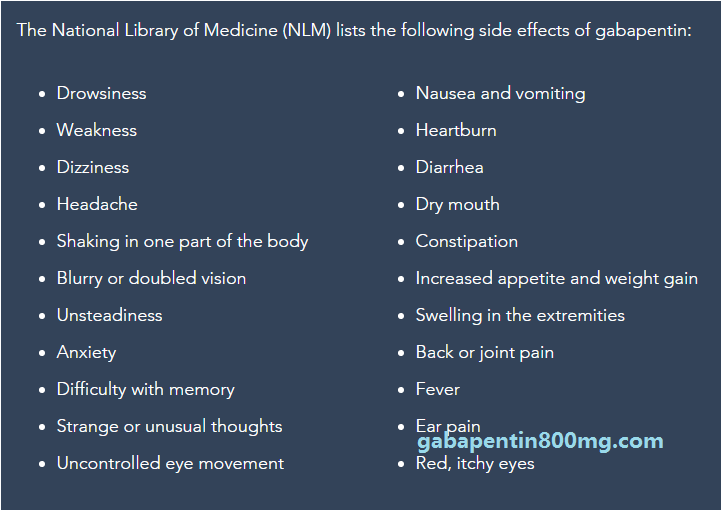Do not stop taking NEURONTIN without first talking to your healthcare

provider. Stopping NEURONTIN suddenly can cause serious problems.
NEURONTIN can cause serious side effects including:
1. Suicidal Thoughts. Like other antiepileptic drugs, NEURONTIN may cause suicidal thoughts or actions in a very small number of people, about 1 in 500.
Call a healthcare provider right away if you have any of these symptoms, especially if they are new, worse, or worry you:
-
-
- thoughts about suicide or dying
- attempts to commit suicide
- new or worse depression
- new or worse anxiety
- feeling agitated or restless
- panic attacks
- trouble sleeping (insomnia)
- new or worse irritability
- acting aggressive, being angry, or violent
- acting on dangerous impulses
- an extreme increase in activity and talking (mania)
- other unusual changes in behavior or mood
-
How can I watch for early symptoms of suicidal thoughts and actions?
- Pay attention to any changes, especially sudden changes, in mood, behaviors, thoughts, or feelings.
- Keep all follow-up visits with your healthcare provider as scheduled.
Call your healthcare provider between visits as needed, especially if you are worried about symptoms.
Do not stop taking NEURONTIN without first talking to a healthcare provider.
- Stopping NEURONTIN suddenly can cause serious problems. Stopping a seizure medicine suddenly in a patient who has epilepsy can cause seizures that will not stop (status epilepticus).
- Suicidal thoughts or actions can be caused by things other than medicines. If you have suicidal thoughts or actions, your healthcare provider may check for other causes.
2. Changes in behavior and thinking –Using NEURONTIN in children 3 to 12 years of age can cause emotional changes, aggressive behavior, problems with concentration, restlessness, changes in school performance, and hyperactivity.
3. NEURONTIN may cause serious or life-threatening allergic reactionsthat may affect your skin or other parts of your body such as your liver or blood cells. This may cause you to be hospitalized or to stop NEURONTIN. You may or may not have a rash with an allergic reaction caused by NEURONTIN. Call a healthcare provider right away if you have any of the following symptoms:
-
-
- skin rash
- hives
- difficulty breathing
- fever
- swollen glands that do not go away
- swelling of your face, lips, throat, or tongue
- yellowing of your skin or of the whites of the eyes
- unusual bruising or bleeding
- severe fatigue or weakness
- unexpected muscle pain
- frequent infections
-
These symptoms may be the first signs of a serious reaction. A healthcare provider should examine you to decide if you should continue taking NEURONTIN.
Gabapentin comes as a capsule, a tablet, an extended-release (long-acting) tablet, and an oral solution (liquid) to take by mouth. Gabapentin capsules, tablets, and oral solution are usually taken with a full glass of water (8 ounces [240 milliliters]), with or without food, three times a day.
These medications should be taken at evenly spaced times throughout the day and night; no more than 12 hours should pass between doses. The extended-release tablet (Horizant) is taken with food once daily at about 5 PM. Follow the directions on your prescription label carefully, and ask your doctor or pharmacist to explain any part you do not understand. Take gabapentin exactly as directed. Do not take more or less of it or take it more often than prescribed by your doctor.
Gabapentin extended-release tablets cannot be substituted for another type of gabapentin product. Be sure that you receive only the type of gabapentin that was prescribed by your doctor. Ask your pharmacist if you have any questions about the type of gabapentin you were given.
Swallow the extended-release tablets whole; do not cut, chew, or crush them.
If your doctor tells you to take one-half of a regular tablet as part of your dose, carefully split the tablet along the score mark. Use the other half-tablet as part of your next dose. Properly dispose of any half-tablets that you have not used within several days of breaking them.
If you are taking gabapentin to control seizures or PHN, your doctor will probably start you on a low dose of gabapentin and gradually increase your dose as needed to treat your condition. If you are taking gabapentin to treat PHN, tell your doctor if your symptoms do not improve during your treatment.
Gabapentin may help to control your condition but will not cure it. Continue to take gabapentin even if you feel well. Do not stop taking gabapentin without talking to your doctor, even if you experience side effects such as unusual changes in behavior or mood. If you suddenly stop taking gabapentin tablets, capsules, or oral solution, you may experience withdrawal symptoms such as anxiety, difficulty falling asleep or staying asleep, nausea, pain, and sweating. If you are taking gabapentin to treat seizures and you suddenly stop taking the medication, you may experience seizures more often. Your doctor may decrease your dose gradually over at least a week.
Your doctor or pharmacist will give you the manufacturer’s patient information sheet (Medication Guide) when you begin treatment with gabapentin and each time you refill your prescription. Read the information carefully and ask your doctor or pharmacist if you have any questions. You can also visit the Food and Drug Administration (FDA) website (http://www.fda.gov/Drugs) or the manufacturer’s website to obtain the Medication Guide.
